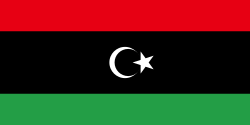| Permanent Representative of Libya to the United Nations | |
|---|---|
 | |
since May 2022 | |
| Style | His/Her Excellency |
This article needs additional citations for verification .(May 2025) |
 |
|---|
|
The permanent representative of Libya to the United Nations is the leader of the Libyan delegation to the United Nations, and in charge of the Libyan Mission to the United Nations. Libyan representatives to the UN hold the personal rank of ambassador.
The Permanent Representative, currently Elmahdi S. Elmajerbi, is charged with representing the Libyan government in the United Nations and during almost all plenary meetings of the General Assembly, except in the rare situation in which a senior personnel of the Libyan government (such as the Libyan Foreign Secretary or the Libyan Head of State) is present.
Taher Al-Sunni is the permeant representative under the command of the Presidential Council led by Mohamed al-Menfi.

